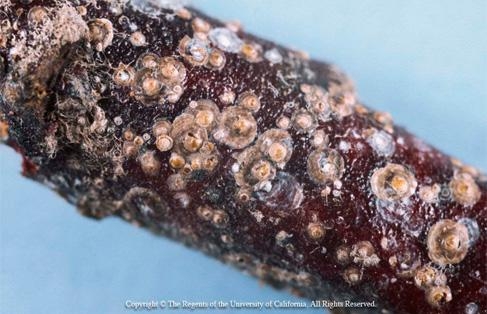By Jeanette Alosi, Butte County Master Gardener. March 15, 2013

Scales are insects that suck plant fluids by inserting a tiny straw-like mouthpart into various parts of a plant. Scales are very small, and when they are doing their damage (in the larval stage) they are wingless and have no distinguishable body parts. Unlike aphids, for example, scales are slow moving or immobile.
The damage of a scale infestation depends upon the type of scale, the species of plant, environmental factors, and the proximity and numbers of natural enemies.
The two common scale families are soft and armored scales. Soft scales may be smooth, cottony, or waxy. They are usually about one-eighth to one-quarter-inch in diameter, and round to oval in shape. They feed on fluid-conducting phloem plant tissue and excrete honeydew. Common soft scales are black scale, brown soft scale, cottony cushion scale, and European fruit lecanium scale.
Armored scales are tinier than soft scales (less than one-eighth-inch) with a flattened, removable scale cover. They do not excrete honeydew. Common armored scales include California red scale (on citrus) and San Jose scale.
There are many other species of scales and scale look-alikes. It is important to identify the scale family in order to determine the most effective control methods.
Most female scales produce eggs without mating. The eggs hatch into crawlers (also known as first instar nymphs). Crawlers, about the size of a typed period, are usually pale yellow to orange. After a few days, they establish themselves on a nearby feeding site and rarely move again. Once they become firmly attached to a feeding site, scales will grow through several larval stages during their lifetime (although their appearance will not radically change) before becoming adults. Most soft scales produce one generation a year. Armored scales produce several generations a year.
Scale damage is dependent upon the level of infestation. In addition to yellowing leaves, plants affected by scales may experience premature leaf drop and discolored blemishes on fruit, leaves or twigs. If heavily infested with armored scales, twig dieback may also occur. The main problem with soft scales is the secretion of sugary honeydew which attracts ants and encourages the growth of black sooty mold. Soft scales rarely kill trees and shrubs but can reduce plant vigor, while recurrent infestations of armored scales can cause twig and branch dieback.
In most cases, scales are controlled by natural enemies, especially parasitic wasps. A parasitized scale will appear darker than normal. Other natural enemies include lady beetles (“lady bugs”), lacewings and mites. Because ants feed on the honeydew secreted by scales, they will protect the scales from their natural enemies. Controlling ants will therefore help to decrease the scale population. Beware of using broad-based insecticides because they kill beneficial insects and scale parasites indiscriminately, as well as the scales and ants.
Cultural practices to control scales include pruning to improve air movement and light penetration into dense canopies, and selection of plants that are less prone to scale infestation. Because scales tend to be host-specific, replace problem plants with plants less attractive to scales. Planting flowering plants near scale infestations will aid in attracting natural enemies.
For limited scale infestations, prune out heavily infested branches. Pruning to open up the tree canopy will expose scales to the hot sun, increasing their mortality.
Heavy infestations may require the use of horticultural oil during the dormant season or when the crawlers (nymphs) are active during the growing season (late winter to early summer). Read the label carefully when mixing with water, as horticultural oils may damage plants under certain conditions. To smother (and destroy) the scales, affected areas including the undersides of leaves must be thoroughly coated with the horticultural oil spray. On larger ornamental shade trees (non-fruit-bearing), a soil-applied systemic insecticide might be considered.
For more information, see “Scales, Pest Notes Publication 7408,” at
http://www.ipm.ucdavis.edu/PMG/PESTNOTES/pn7408.html
Photo: San Jose scale on peach branch